B.R. Sanders's Blog, page 12
February 12, 2016
Book Review: TREMONTAINE, SEASON 1
Sorry if you checked here earlier and there was no content! I set this to auto-publish, then I broke my ankle and forgot to a) write the review and b) turn of the auto-publish. My apologies for any confusion!
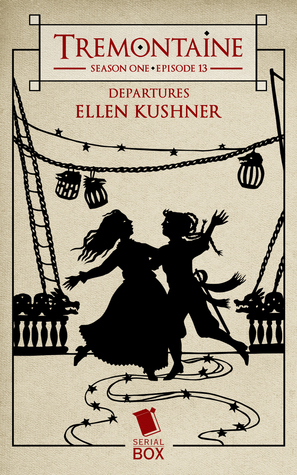
Serial Box | Amazon | Goodreads
Notes on Diversity:
A great and glorious diverse cast! So much queer! There are brown people! There is a decidedly not neurotypical child! There are poor people, and there are rich people, and every one of them is beautifully realized and fully-rounded!

Well done!
Review:
Tremontaine, Season 1—created by Ellen Kushner, and written by Ellen Kushner, Alaya Dawn Johnson, Malinda Lo, Joel Derfner, Racheline Maltese, Patty Bryant, Paul Witcover (guest author)–is ambitious. The cast is large; the scope of the plot is huge and full of intrigue.
The Duchess of Tremontaine banks the Tremontaine fortune on a ship called the Everfair. When the Everfair sinks, slowly, methodically, all hell breaks loose on the sly. Of course we see the Duchess’ perspective on the matter, but we also see how this single event changes the course of dozens of other lives: the chocolate traders (among them the wily and overly curious Kaab Balam) whom the Duchess has woven into her plots, a young scholar (Rafe Fenton) whose merchant family has financial ties to the Duchess. And through happenstance and talent, a farmer girl named Micah runs into Rafe Fenton and becomes a scholar herself. There are more characters, a great many more–Kaab’s family, Kaab’s forger girlfriend, Tess the Hand, the swordsman Vincent Applethorpe, the Dragon Chancellor, and the Duke of Tremontaine himself. Each have their own arc within the story. Each have their own lives, and their own part to play in this tale.
But, oh, the relationships! Each one is so carefully crafted and developed over time! EVERYTHING HERE IS SHIPPABLE FARE MY FRIENDS. I found myself, in particular, rooting for Kaab and Tess, and I was not disappointed.

Those two crazy kids. It’s written as love at first sight (at least on Kaab’s) end, but she does not approach Tess as a thing that is owed her. They become friends, they experience horror and joy together, and then they become lovers. And even then the story doesn’t stop. Kaab and Tess are from vastly different cultures, different classes, have wholly different ways of interpreting the world. The immensity of their cross racial/cross cultural romance is not downplayed in the text at all, and I loved the book (season?) for that. I also loved that Kaab and Tess were, in so many ways, equals. Yes, Kaab is a warrior, and trained, and is held in high esteem by her people. Tess…less so, as a Riversider. But Tess is a forger of great reknown. She is good enough that she needs a dang bodyguard. She has formidable talents, too. She is no simple damsel in distress.
And the plot. I wonder what it must have been like for the writers to parse out a plot this convoluted but this cohesive. Nothing that’s introduced get’s dropped. As the finale closes in, all the puzzle pieces fall into place, all the foreshadowing pays off. But…how? How do you do that with all these writers writing the same thing? Wonderful execution. and speaking of wonderful execution, the narration by Nick Sullivan, Sarah Mollo-Christensen, Katherine Kellgren was pitch perfect the whole way through.

Want posts like this delivered to your inbox? Sign up for my newsletter!


February 10, 2016
The Great Ankle Break of 2016
BLACK ICE, Y’ALL. BEWARE THE DARK HEART OF WINTER.
![giphy[1]](https://images.gr-assets.com/hostedimages/1455234882ra/18077193.gif)
It got me, y’all. The ice got me bad.
So here’s what happened: I was walking past a bank a block and a half past work on Friday evening to go to yoga. I was on the phone with my partner, Jon, to make sure that it was ok that I go to said yoga class. And I slipped on an unseen patch of black ice. My left ankle twisted and landed underneath me.
The good: I didn’t hit my head or anything. Yay! The bad/ugly: when I tried to stand up again, everything from my midcalf on down felt like pain jello. My left ankle would not support my weight. There was pain (not, like, the most pain I’ve experienced), but it wasn’t the pain that kept me from using the leg. The leg simply wouldn’t work. Just wouldn’t go.
Lesson 1: NEVER USE YOUR CELL PHONE IN WINTER UNLESS YOU ARE SITTING IN A VERY SAFE PLACE.
At this point, Jon was still on the phone. I picked it back up and said NOPE NOPE HEY GUESS WHAT YOGA’S NOT ON THE MENU DONE SOMETHING BAD WRONG TO MY ANKLE HEY CAN YOU PICK ME UP.
“Are you ok?”
“Don’t know. Come pick me up.”
“It’ll take me about forty minutes. Do you want to call a cab or–”
“Nope. I want to wait for you.” I gave him my intersection, scouted my situation, and saw some planter boxes about 30 or so feet away that looked decent for the sit-and-wait portion of this terrible night.
Things like this are easier for me if I can break them down piece by piece into little solvable problems. I knew I was getting picked up. I had a place to wait. Now it was just about mapping a route to get to those planter boxes.
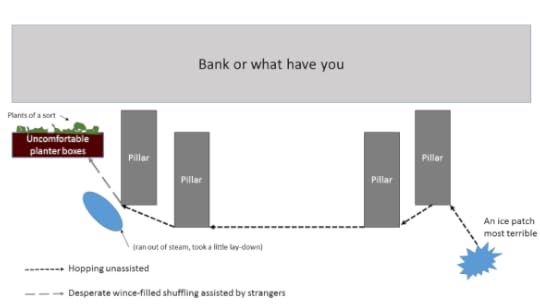
It was a real long thirty yards, y’all.
Being white, and being assigned female at birth and looking the part, and looking generally pretty young, I got a number of requests for help. I held out stubbornly until that last pillar, when the strength in my right leg was beginning to go, and when I saw that the tiles near the planter boxes were icy. Oh, for fuck’s sake, what if I slip and fuck up my good leg trying to get there. I took a little rest by the pillar to recalibrate. A woman offered to help me, and I took her up on it, hopping the final length, but letting her support some of my body weight.
The planter boxes were not benches. The space for sitting on them was only, maybe, and inch deep. There was no way to get comfortable. But at least I didn’t have to stand balancing on one tired leg. At least it was a place out of the way to rest. While I sat there, someone from the bank slipped out an put a caution sign on the patch of black ice. They offered me nothing. I saw at least one other person fall on the ice anyway, even with the sign there.
I managed to keep my shit together right up until Jon got me to the car.
Lesson #2: Try as you might, you never quite stop thinking like a poor kid.
Ok, so now I’m in the car. It’s all pain jello in my foot. I know it’s not ok, but I’m like, “let’s just go home, ice it, wrap it up really tight and just see how it goes.”
And Jon’s like,”….what?”
“Let’s just, you know, let’s just see.”
“I think you should consider going to the doctor, B,” he says, so very very gently.
And then this happened:

Because
doctors cost money
what if it’s just a little sprain and I’m over-reacting THAT’S PROBABLY IT and then it would have been a $150 after-hours co-pay FOR NOTHING OMFG
they also misgender me? and I’m also stressed out?
and our other partner, Sam, is supposed to have a date with one of her boyfriends and now my stupid clumsy ass is RUINING IT
what if it’s not a little sprain (it probably isn’t a little sprain) and the doctors do shit and IT HURTS WORSE
WHAT IF THEY TRY TO GIVE ME SHOTS I have a thing about shots and blood (I pass out)
DOCTORS COST SO MUCH MONEY
THE MONEY! YOU ONLY GO WHEN YOU KNOW IT’S REALLY IMPORTANT AND i’M NOT SURE????
Every single time I think I’ve gotten over this shit it comes back. Every single time.
So I cried about it. And then I told him to take me to the hospital because it was the responsible thing to do even though I really, really didn’t want to go. And Jon was a wonderful caretaker.
Which brings me to:
Lesson #3: I really have to stop relying on my apparently ridiculously high tolerance for pain.
Jon wheels me in and gets me checked in. Someone comes in to see me. My lower left leg is swollen now. They ask me what my pain is at; I say about a 6 (using natural childbirth back labor as a 10). They take me for an x-ray. They ask me what my pain is at again, and raise their eyebrows when I say 6. The technician who wheels me back to my room says I “really did a number on my leg. You’re at a 6?”
I know then that I didn’t waste the co-pay. But all that really means is that there are more and more medical expenses waiting to pile up. Fuck.
Another doctor comes in, tells me that three leg bones join to make up the ankle. Lucky me, I’ve managed to break all three in a single fall. Always was an overachiever, I guess. Might require surgery, she says, and my mind turns on the white noise. They send me for a CAT scan. When that’s over, they try to give me intravenous pain meds (Dilaudid), but I CANNOT DO IT. I have blood injury injection phobia, which is part of the reason my brain went all NOPETOPUS when the doctor mentioned surgery, and is also why when the well-meaning nurse comes in the room bearing a needle I roll over to my side and hiss, “Pills, please give me pills for the pain, I can’t do a needle, I’m sorry, pills only,” while Jon tries to explain. But maybe I should have taken that goddamn needle and passed out and been done with it.
An hour or so later, the pain is at a me-7. A paramedic comes in with a percocet and tells me he’ll splint my leg, after which I can go home. But the single percocet is all the pain treatment I am getting since I refused the other meds, and am I sure?
I am sure. Gotta be now, right?
He comes back to splint me before the percocet has really kicked in, and we do the thing. So, what would have been done on derivative of morphine that definitely would have been running through my system at that point was happening to me on one single percocet that had not really made it to my bloodstream yet. This was grisly shit. The paramedic had a wonderful bedside manner, but this was still grisly shit–twisting bones back to where they were supposed to be through swollen flesh and wrapping all that in place. And my job was to lie there and take it. And I did. Using breathing techniques I learned for labor. It was intense.
Learn from my mistakes, friends. Watch where you’re walking. Use insurance if you have it. And don’t spend a lifetime minimizing your physical pain to an absurd degree such that it bites you in the ass.


February 9, 2016
Disrupting Publishing Linkspam: 2/9/2016
It’s that time again: that time every week where I round up links to articles written by marginalized people pushing back against oppression in publishing. I’m aggregated as many marginalized voices as possible from as many vectors as possible, and the more intersectional the better. As always if you’ve read something I missed please link it in the comments.
“Diversity 101: An Intro to the Diversity Discussion” by Justina Ireland
So, I think we can all agree that it is incredibly frustrating to have the same conversation over and over. At some point your eyes glaze over and you sigh and say “Never mind, don’t worry about it.”
This is what is happening with regards to conversations surrounding diversity. The same three or four convos keep getting repeated over and over. So, as a timesaver, consider this your introductory course to the diversity discussion. I doubt this will be the last entry, but it’s a good first step.
“Empathy Is Not A Disability” by Foz Meadows
The opposite of feeling instinctively “sorry” for a disabled person isn’t assuming they’re totally happy with their lot in life and the unique perspective it affords them, but is rather to treat them like a fucking person: that is, to not make judgements about how they might feel about themselves – or anything else, for that matter – on the basis of first appearances and their membership, visible or otherwise, of an enormously diverse group.
“A Brief Analysis of the Locus Recommended Reading List, 2011-2015” by Natalie Luhrs
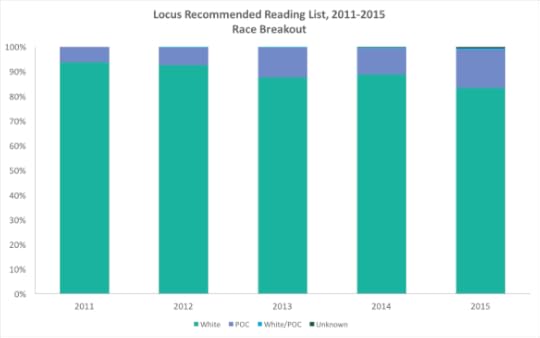
MORE FROM THE POCS DESTROY SFF KICKSTARTER
“Assimilation: The Borg Must Like It When You Don’t Fight Back” by S.L. Huang
The Asian-American community has a long tradition of trading our own creativity and culture for “success.” A devil’s bargain: all the success you could ask for, and all it costs is your soul.
This isn’t true for all Asian-Americans, of course. But to some degree, at least, it’s true for me.
I wonder if I don’t write more Chinese characters because my father achieved his goal too well. Despite all my best efforts to reclaim my heritage, maybe all I have is an empty space I’ll always be chasing, like a gerbil spinning on a wheel.
Or maybe, despite all my anger, I myself am subconsciously following the very same path I’ve criticized my father for laying down: ducking my head and not being too Asian, because I want to be seen as a Real American Writer.
“You Don’t Have to Write Autobiography” by Ken Liu
So I wrote “The Paper Menagerie,” a magic realist tale that meditates upon our shifting attitudes toward our parents as we come of age; it also obliquely critiques the dominant mode of popular, assimilationist immigrant narratives. As a story that literalizes complicated metaphors, it can, and has been, read in multiple ways with various levels of textual support.
But the one reading it cannot support is autobiographical. The protagonist’s life bears almost no resemblance to my own. I am an immigrant; he is not. Both my parents are Chinese; his are not.
Yet, more than a few readers insisted on reading it as autobiography—and even as non-fiction. Many wrote to me to berate me for how I “treated my mother,” and others wrote to me to say they were moved by my “personal experiences.” Plenty of reviews speculated about my own childhood based on the story. When I gently explained that the story was pure fiction, at least one reader told me that he no longer found it moving as a result.
“This Is What Happens to Us” by Suyi Davies Okungbowa
So, this is what happens to us. SF lovers visit the white-only SF section and pick out titles from their favorite white authors. Lovers of mainstream African fiction visit the African Fiction section, gloss over the SF books presented there, then move on because, “Weird is not really our thing.”
“White Bread, Brown Toast” by Indrapramit Das
It wasn’t until I was on a campus in the middle of Pennsylvanian Amish country, surrounded by young white undergrad creative writing students in a workshop class taught by a white professor, that I realized I mostly wrote white protagonists. I’d never felt less white, which made the repeated pallor of my protagonists blaze like a thousand suns.
“Intergalactic Collard Greens” by Troy L. Wiggins
Mainstream science fiction also seemed to possess a set of very scientific rules regarding what happened when one encountered blacks:
There were never more than three black people in any respective galaxy, except for random planets somehow chock-full of blacks who were unable to progress their culture past iron spears and loincloths.
Blacks were not allowed to interact with each other. Instead they were required to float alone and lonely through their respective spaces like lumbering chocolatey gas giants.
If someone absolutely had to die in order to move the plot forward or gird the loins of the hero, it would be someone who looked like the black consumer, or the black consumer’s sister, or the black consumer’s best friend, or the black consumer’s black next-door neighbor
“On Falling In and Out of Love with Science Fiction” by Julie M. Rodriguez
Still, there was something missing. I don’t think it was until my twenties that I realized I couldn’t remember seeing any Spanish names in the genre fiction aisle at my local bookstore. I could only recall a handful of Latino characters in any of the SF books I’d read or films I’d seen. I’d discovered a deep and diverse well of talent in the genre fiction community—so why couldn’t I find any other Latino writers?
“We Were Always Here” by Mark Oshiro
It’s relevant because as much as people want to imagine that non-white fans are just showing up, we’ve been here all along. We watched the Blade films. We celebrated the Star Wars trilogies, both the original and the prequels. We wrote fanfiction, we cosplayed, we wrote our own works.
“The People Men Don’t See” by Nisi Shawl
Let’s tell our own stories and insist we’ve got them right. Let’s keep on writing what needs to be written. Eventually it will be of no real consequence that there are people men don’t see. Our actions will speak for us. Our words will make our worlds known.


February 5, 2016
Book Review: PLANETFALL
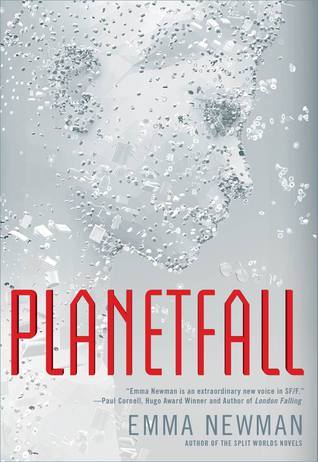
Notes on Diversity:
This book is rich with diversity on multiple levels. The cast is composed mostly of people of color. I read Ren, the main character, as a woman of color. Many of the other important characters–Suh-Mi, Sung-Soo, Kay, Carmen, Pasha, Neela–are also people of color. Their race seems to impact their lives only minimally; it’s presented or coded matter-of-factly, but I didn’t pick up any situations where Ren or others experience outright racism or microaggressions due to their race. I don’t know how much of this is Emma Newman writing as a White woman, and how much of this was intentional on her part (presenting the colony as a space without racism, but some scenes are flashbacks where Ren could have experienced racist interactions?). In any case, the characters are carefully chosen scientists, and they come from a wide array of backgrounds.
Front and center is Ren’s deteriorating mental health. Much of the plot is actually predicated on Ren’s mental disabilities, which are presented here as hoarding, possibly with some OCD symptoms woven in.
Ren (and Kay) is also queer. Like the representation of race, her sexuality is presented without any struggle or any antagonism. She simply is bisexual. This, for me, was refreshing–it was clear that Ren had shame around her sexuality, but it was not because of her desire for other women. It was bound up with her mental health issues. I welcomed and connected with a character who was queer, and crazy, but not crazy because she was queer. And I welcomed that the book acknowledged that craziness impacts how we connect with partners and lovers.
Review:
I both loved this book and felt dissatisfied with it. Like Ren herself, Planetfall is slim and enormously complicated. I wonder if it’s not actually two books stitched together. Right from the start, there are two competing plots. Newman tries to weave them together, but by the ending, it was clear to me that they could have been utterly separate books. And I wanted them to be. And I think I could have loved them both.
Renata Ghali is brilliant. Back on Earth, she figures out technology to print her father a new pancreas, which opens the way for new medical technology that has the potential to save millions of lives. Ren is brilliant, and devoted to her roommate, Suh-Mi, who becomes the Pathfinder. A fluke (or perhaps not?), a mysterious plant, a seed, and then Suh-Mi falls into a coma. Ren stays by her bedside. When Suh-Mi wakes back up, she has a plan, and a vision, and a path to a planet to find God. Ren knows she’ll follow.
But all of that is backstory. The plot takes place on the planet that Suh-Mi has guided Ren and a thousand other carefully chosen devoted to. Ren’s brilliance has leaked into other domains–she’s learned to pilot spaceships for Suh-Mi, she’s learned to engineer sustainable houses for the colony. Planetfall did not go as Suh-Mi planned. Ren has been keeping secrets, and the secrets have taken their toll on her, wearing her down over the years. When a young stranger appears at the edge of the colony, everything in Ren’s carefully calibrated world unravels.
There is part of this book that is about secrets and trauma and healing. That was the part of the book that I was most interested in. Ren as a broken woman, Ren as a woman simultaneously fascinated with and hiding from and trying to heal her past. Over and over again, Ren refers to herself as a mosaic–and I think the metaphor is an apt one. She is loss after loss, and none of them resolved, each one fracturing and shattering her fragile self a little more. Circumstances break her, and she retreats into herself, trying to glue the pieces together.
And above all, Ren is still brilliant. No matter how wounded, Ren is still brilliant. She is the picture of a functional mentally ill person. And as someone who has struggled mightily with depression and anxiety while being functional (while being called smart and impressive), I saw so much of myself in Ren. I don’t hoard things–if anything, I throw them out, get spare and Spartan instead–but I understood her insatiable need to collect, to fix, to make a tangible mosaic between herself and everything that reminds herself of what’s gone so very wrong.
If that was all the book was, it would need to be set on a planet far away, though, would it? It would, however, be a much cleaner book. The book is also a murder mystery. And a book about faith. And about the (literal) nature of humanity. And a book about revenge. I could do with it folding in the murder mystery and the faith*, but this last piece is what really breaks the book for me.
Ren’s redemption is as much to do with faith and her facing a reckoning with long-buried guilt and violence as it is the internal work of mental health. What breaks the book is that this great human reckoning is only hinted at and glanced at. It is crammed into the last few pages of the book, and–most importantly–Ren escapes that reckoning. When the colonies collective chickens come home to roost, Ren watches its effect on her fellows, but she scrambles away and literally goes on a journey of faith herself. It is implied, at the end, that the choice she makes services a collective good, but I found myself left with so many questions. Would she have made that choice if not driven there by the threat of bodily violence? Maybe her choice leads to good for future individuals, but what about her friends and lovers she’s left behind at that moment, the ones facing bodily harm literally at that moment? Is it a redemption, or is it an evasion?
And if there was to be no narrative payoff, no closure for all of that chaos and violence only just introduced in those last few pages, then why introduce it in the first place? why not drive Ren to those final choices in another, different way?
So much of the book was so very very good, but the book seems to lose narrative cohesion right at the end. I understood what was happening, but not the narrative choices that Newman employed here. The gravity and stakes of the ending was so high after I was so invested in the characters and the book that refusing to give closure–and guiding Ren to a choice that frankly, seemed to minimize, what was happening below her–felt like a cheap shot.

Want posts like this delivered to your inbox? Sign up for my newsletter!


February 3, 2016
GUEST POST: On Black Elves by Constance Burris
I am THRILLED to have Constance Burris here with a guest post today! I loved her book, Black Beauty, and I have her book Coal high up on my to-read list. Constance is a fabulous, thoughtful writer. Take it away, Constance!
I’m a thirty-something-year-old black woman, and I wrote a novel with elves, dwarves, and dragons living the fey realm. Then I really went off the rails and wrote a prequel where magical elves interact with poor, black urban youth in the human realm. For me, this was my way of inserting myself (poor and black) into the (lily-white) fantasy I’ve been reading since kindergarten.
Like a lot of people, I love stories with fey– elves, dwarves, giants, and trolls. But I was never able to see myself in any of the heroes until I stumbled across The Dark Elf Trilogy by R.A. Salvatore. As a black nerd, I hungrily devoured any fantasy where I could see myself reflected back. When I discovered Drizzt, a dark-skinned elf, I 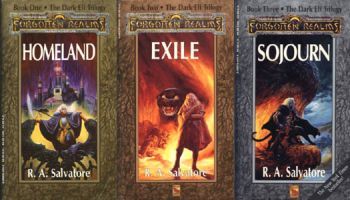 fell in fandom. Yes, the dark elves were still considered evil, and thus it fell into the dark skin equals bad stereotype, but Drizzt was dark-skinned and good.
fell in fandom. Yes, the dark elves were still considered evil, and thus it fell into the dark skin equals bad stereotype, but Drizzt was dark-skinned and good.
Eventually, I found the RA Salvatore forums where I could talk with other fans about Drizzt all day every day.
One day, while conversing with who I thought were my people over the love of Drizzt, the topic of who should play him in a movie came up. That’s easy Wesley Snipes, yo! He was popular (at the time) and he had the dark black skin color that would match perfectly with Drizzt.
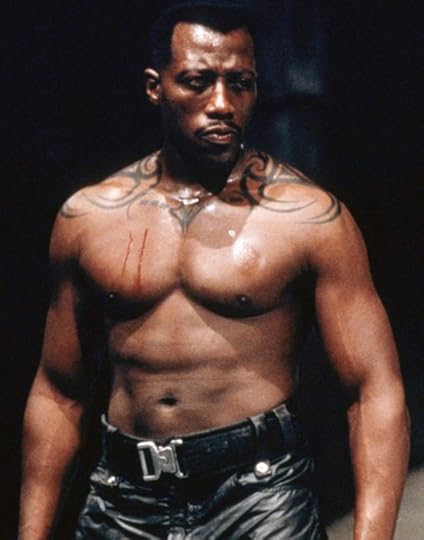 Ah lawd, all hell broke loose. How could I possibly indicate that a black man could play the role of an elf? What the hell was wrong with me? According to the forum, elves do not have such negroid features like a wide nose, thick lips, or kinky hair. Are you crazy? Elves are tall and slender with straight noses and thin lips. They have Arian features.
Ah lawd, all hell broke loose. How could I possibly indicate that a black man could play the role of an elf? What the hell was wrong with me? According to the forum, elves do not have such negroid features like a wide nose, thick lips, or kinky hair. Are you crazy? Elves are tall and slender with straight noses and thin lips. They have Arian features.
Needless to say, I was trolled and bullied out of the forum.
The experience stuck with me.
I decided to write my own story with black elves. To stick with the original canon, I made all of the elves white except for the main elf, who by way of shapeshifting, chose to be black. She still has Arian features. But in Book 2, I will have my negroid elf. He (or she) will have a wide nose, thick lips, muscular build, and kinky hair. I will take these elves that were never intended to look anything like me and create them in my own image.
I’m writing the books I want to read with characters that look like me and mine.
So I want to give a shout out to the bullies in the RA Salvatore forum. Your racist hatred inspired me to write and finish my first book. Good looking out.
For fun, here is the post I wrote when I tried to pitch my first novel to a literary agent.
Constance is an environmental engineer by day and a writer of black science fiction, fantasy, and horror by night. You can find her first book COAL here and the prequel BLACK BEAUTY here. She blogs at www.constanceburris.com/blog.


February 2, 2016
Disrupting Publishing Linkspam: 2/2/2015
It’s that time again: that time every week where I round up links to articles written by marginalized people pushing back against oppression in publishing. I’m aggregated as many marginalized voices as possible from as many vectors as possible, and the more intersectional the better. As always if you’ve read something I missed please link it in the comments.
Moar from the POCs Destroy SFF Lightspeed Kickstarter
“We’re Going Places” by Jeremy Szal
Diversity cannot exist if it exists solely within America and is dominated by American terms. So how do we do that? How do we move past that singular ideal?
“Dancing in the Margins” by An Owomoyela
I want to write because it’s important to me to see writing into the edge cases. Because those edge cases, and the ways in which race/ethnicity/color/call-it-what-you-want is defined, is manifested, in different places, at different times, is a huge part of the mess about what it means to be white or not in our community—this community that I live in and write in, and which affects me, day to day.
“On Destruction” by Naru Dames Sundar
In “destroying” SF, we are in fact rebuilding it, we are taking all that it was and adding to it. There are many voices out there, voices of different races, cultures, backgrounds. Voices that carry an authentic understanding of the things that underpin their histories, their people’s histories. I want to see their histories extrapolated into that unknown future. I want to see the stories that come out of their unique and incredible experiences.
“Blue-Shifted Futures” by Vajra Chandrasekera
No, Zhemais just referenced it because Colombo was the nearest major port to his fictional island. The funny part is that I noticed it so intensely, this one throwaway line, that I remember it to this day. It was the first time I’d read a science fiction novel showing a future that included my city in it, and it didn’t even need to be on fire.
“The Amazing Authentically Authentic Latina Author!” by Silvia Moreno-Garcia
Doesn’t ring true generally means people expect you to bring in the exotic. They’ll be like, “I once went to Acapulco so this gives me super great knowledge about your country and therefore this is not exotic enough.” Awesome. They want you to show a sarape, bring out the donkey. Check out the rooster in The Three Caballeros. That’s the sense of place you should aim for.
“On the Topic of Erasure” by Z.M. Quỳnh
I write so that I can become whole, so that we may become whole once more. I write so that my stories will be real again, so that my people’s stories will become our own.
“Unlearning Erasure” by Julia Rios
When I was much older, I had a conversation with my sister in which we both discovered that we had found the show I Love Lucy comforting as children. It was the only thing on TV that showed a family with a white mom and a Latino dad who shouted a lot and also liked to sing. The conversation made me realize how much seeing ourselves represented in fiction had meant to us. How much erasing ourselves from the default narrative was damaging. I thought again about all the books and movies my father had introduced me to, and I wondered how that sense of self-erasure had damaged him.


January 31, 2016
Novelette Review: CALIFORNIA SKIES
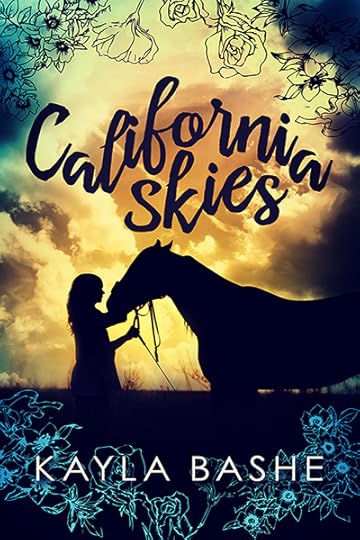
Less Than Three Press | Amazon | Goodreads
FTC disclosure: I received a free digital copy of this book in exchange for an honest and unbiased review.
Notes on Diversity:
Y’ALL. This is a NON-BINARY TRANS ROMANCE.

The book is very queer, frankly so, in a way I deeply appreciated. The treatment of its central transgender/non-binary character–California Talbot–ways lovely and thoughtful. I also loved that there is a gulf between Maggie and California, that for the romance to blossom they must cross a chasm of class of which they are both acutely aware.
It is a very White novelette; I won’t lie. I read California as racially ambiguous. California themself is an orphan described as golden-skinned and black-haired, which in the West could mean any number of things. But it’s not called out explicitly, it’s all an open question.
Review:
California Skies, by Kayla Bashe, is a story about two people, each told by society they are unlovable, who find solace in each other.
It’s also a story about righteous vengeance.
The Chelson gang comes after Maggie’s family, looking for jewels they’ve hidden. They’ve hidden them so well that the gang doesn’t find them. In their frustration, they kill her brother, maim her sister, and slice up her face. Once her wounds turn to scars, Maggie searches for California Talbot, a mysterious childhood friend turned bounty hunter, to help her hunt down the gang that tore apart her family.
She finds California wearing a calico dress and dried blood in a dusty bar. Their is, immediately, a brawl. California is impressed when Maggie stands her ground. Maggie came already impressed by the memories of California and is smitten before the afternoon is out. Together, they track the Chelson gang, each getting to know each other again, slowly, tentatively, falling for each other.
Maggie has to get over her scars. After a lifetime of being told her worth is tied to physical beauty, she no longer feels like she has any appeal to anyone. She is trying to reconcile herself to invisibility. And yet, California sees her. Consistently sees her. But, still, Maggie can’t quite allow herself to trust it:
It felt strangely beautiful to have someone looking after her. She hoped she never got too used to it; a woman with a maimed face, after all, would never have anything like a wife.
Ah, there’s so much to go on about. I love that Maggie is a writer, and that to love her is to love the stories she constructs. And I love that California knows and understands this about Maggie, and that on their journey they construct their own narrative. I love that the only things that hold them back from each other are narrative that they’ve been told by others–things about class, things about beauty–that the other doesn’t believe. Things that they cast off in due time.
I love all of this in part because as a genderqueer and queer person so much of my adult life has been, quite literally, about the creation of very intimate and personal narratives. About how what we’ve been told is true about beauty and life and love and families doesn’t actually have any weight except the weight we give it.

I loved this story. I loved these characters. I am definitely going to seek out pretty everything Kayla Bashe has written after this.

Want posts like this delivered to your inbox? Sign up for my newsletter!


January 29, 2016
Book Review: BOOKBURNERS, SEASON 1
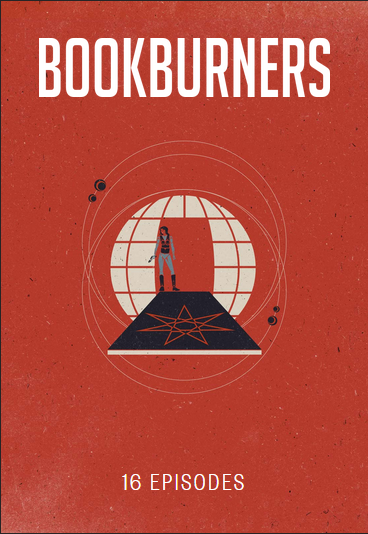
Notes on Diversity:
Bookburners follows Team Three of the Vatican’s anti-magical forces, and Team Three is canonically multi-culti and world-traveling. Sam Brooks, the lead character, is a White woman, but her team mates spend as much time in the spotlight as she does. Asanti, the archivist, is a Black woman with fascinations and curiosities all her own. Father Arturo Menchu is a South American priest haunted by past mistakes. Grace Chen is Asian, and a powerhouse–the team’s secret weapon–and incredibly layered. Liam is an Irish White guy…so not diverse. But he is well-written, and he is a character who is actively coping with PTSD more or less openly through the entire course of the season (book?).
Basically, I was pleasantly surprised.

It makes absolute perfect sense that the Roman Catholic Church would have an ethnically/racially diverse group of people targeting magical artifacts given that Catholicism has a global reach, but, honestly, I think many authors would have taken this story and whitewashed it.
Review:
Bookburners is a team-written serial piece of fiction* about a lady cop who gets drawn into a world of magic thanks to curiosities of her wayward brother. Perry Brooks, Sal Brooks’ ne’er-do-well brother, gets his hands on an old, creepy book. And then that book gets its hands on him. Sal is drawn into the web of Team Three’s secret dealings, the ways in which they pull magic artifacts out of the world to protect unknowing mortal citizens, to get her brother back. Over the course of the season, along with Sal, we are introduced to magic users (benign and otherwise), the good and bad sides of the Vatican, and her teammates in Team Three.
Like the best serial dramas on TV, Bookburners strikes a great balance between problem-of-the-week story in a given installment and slowly building a season-long arc over the course of each episode. Some episodes pull more directly into that season-long arc than others, but all of them are excellent. Similarly, Bookburners features mutiple authors working together to create a single cohesive voice, and they pull this off quite well overall.
There are some real standouts to Season 1. The theme of redemption comes through loud and clear–not just for Perry Brooks, but for Sal herself and for Arturo Menchu, and also for Grace. Grace became, over time, my favorite character.

GRACE, GET YOUR CANDLE AND HOLD IT TIGHT.
Grace starts the story giving virutally everyone the cold shoulder and slowly, carefully, opens up to Sal. It takes until episode 7 (“Now and Then”) for the reader to learn much about Grace at all besides the fact that she is sharp-tongued, and reads a lot, and that she is incredibly, almost monstrously dangerous in a fight. But in episode 7 everything comes together, and we learn why she is the way she is. And it is so wonderful. But this part is key:
We’ve always recruited from survivors.
Menchu says this to Sal as a way of explaining that everyone on the team has been touched by magic in some way before joining the team. He says it to tell her that she is not alone, that her position is not unique, that they have all had horrifying scrapes with the uncanny, and lived, and been unsettled enough to want to protect the world from it. That’s why they’re there; that’s why they’re teammates. But then, he tells her to “let Grace be Grace.” He refuses to tell he what she survived. The perspective switches, then, so that the reader sees what Grace survived from her own perspective. We are allowed to see Grace be Grace. Between this episode and a later episode (episode 10, “Shore Leave”) where Grace is allowed a day off, the story for me shifted very much to Grace. I still like Sal very much, but Grace was the one I was hooked on. She was the one who held the emotional stakes for me. By the last episode (16, “Siege”), I was desperate for resolution for her.
The beauty of the way Bookburners is written is that there is enough POV switching between the characters, and most of the characters have enough depth, that you are likely to hook into one of the teammates like this and find your favorite and ride them to the end. It is unequivocally Sal’s story, but Liam and Grace and Menchu all have their own side stories which have enough depth and pathos for you to dig into and connect with. Asanti, I feel like, is the weak link here–not present enough on the ground in their missions in the early episodes to get fully realized, but fascinating, but still somewhat two-dimensional by the season’s end.
I wonder where Season 2 will go. Given the ending of Season 1, it’s clear Sal will stick with the team, but there are intriguing questions with regard to her brother. I wonder what the arc will be. I want to see more of Asanti–much more of Asanti. I’d like to see more of Menchu beyond the fatherly team leader role. And Grace. Give me all the Grace-centric episodes you can, please.
Suffice to say my subscription is renewed.

Me when I saw that Season 2 is a go and that Amal El-Mohtar is joining the writing team

*So it’s a book that was released episodically. All the episodes are now available through Serial Box, so you could read it (or listen to it; I more or less alternated) all in one big gulp. The writing team behind Bookburners is stellar: Max Gladstone, Margaret Dunlap, Mur Lafferty, and Brian Francis Slattery. Xe Sands’ narration for the audiobook is also really excellent.
Want posts like this delivered to your inbox? Sign up for my newsletter!


January 27, 2016
Goal Update: January
Trying something a little more structured this year! My year long goals are here for reference. To recap, here are the plans I had for this month:
Finish edits on Extraction and turn in polished second draft to press
Write a short story
Blog on schedule
Extraction
Edits are very extremely nearly done! Probably by the end of this week I’ll be able to tie up those last loose ends and send it to my editor. On track!
I also am very, very tempted to go on a close reread of everything canon in the Aerdh universe right now, as I’m migrating all my universe worldbuilding notes to Evernote. I have a tendency to do this every couple of years. It happens usually when I close-edit a big project (like this), and then the editing madness comes upon me, and then I feel compelled to make sure everything fits. I am currently trying to decide if this is necessary or not.
Short Story
I have two very fleshed out ideas, one of which is in active progress and probably will be drafted by the end of the months. On track!
Blog
Off to a rocky start, there, at the beginning of the month, but we’re back on track!


January 26, 2016
Disrupting Publishing Linkspam: 1/26/2016
It’s that time again: that time every week where I round up links to articles written by marginalized people pushing back against oppression in publishing. I’m aggregated as many marginalized voices as possible from as many vectors as possible, and the more intersectional the better. As always if you’ve read something I missed please link it in the comments.
About that Clarion Tweet
Ann Leckie, Blog Post (1/19/2016)
Now, Gaiman has no obligation to worry about the emotional states of every new or struggling writer. He can quite easily ignore a day’s cloudburst on twitter. But a lot of struggling or aspiring writers? Can’t ignore him as easily. And by speaking, they send a message to other, silent folks on the sidelines–don’t let this stop you, do your best to put this tweet in your Insignificant bin, keep writing.
“Do We Count As Real Writers, Too? (AKA That Thing About Clarion. That. Thing.)” by JY Yang
The point of this post– if it were to have a point, and not merely be a rambling collection of thoughts– is not that workshops are necessary to become a serious writer. The point is that for people who don’t have easy access to a support system, it feels like it’s necessary in order to break into the global SFF scene. And it shouldn’t be.
“How Can SFF De-Expensify Itself? Lotteries! Lotteries! Lots and Lots of Lotteries!” by Jo Walton
And science fiction and fantasy is incredibly expensive.
Because it’s expensive, it’s elitist.
It directly selects against those on low incomes. It directly selects against those living in countries with comparatively weak currencies. It indirectly selects against those groups who tend to have low incomes, or who live in such countries.
Personal Essays from POCs Destroy SFF Kickstarter
“Pushing Back Against The Wall” by Aliette De Bodard
I get up in the morning, and the same things keep happening with clockwork regularity. I see people who don’t understand how hurtful it is for minorities that writers take viscerally painful subjects and mine them for shiny elements that can be put into a story—how gut-wrenching it is when someone takes your wars and your oppression and makes them into bowdlerised theme parks that readers can dip into for a moment’s entertainment—when this watering-down becomes a lauded, awards-garlanded reference, and everything else is inauthentic, or unnecessarily grim, or too political by comparison to it.
“I’m a Big Black Man Who Writes Science Fiction” by Malon Edwards
I don’t remember the first book I grabbed. Probably Dune. The Bene Gesserit fascinated me. I—now a little eight-year-old black boy on the South Side of Chicago—wanted to be one of them. When my sister came home from college, I told her. We talked science fiction for days. Even today, we still do.
“Spoiler Alert: The Future? Yeah, I’m in It” by Yash Kesanakurthy
Science fiction is often futuristic but, to me, it’s kind of the opposite. To me, it’s about addressing the past. It is about looking at the present and thinking, “How did it come to this?” It is about looking at the page and thinking, “Where will it go from here?”
“I Have a Few Demands” by Khaalidah Muhammad-Ali
No. Miniscule increments aren’t enough. I demand more diversity in the genre I love most. I demand that more POC who write science fiction are given the opportunity to expose the wider world to their genius. I demand that science fiction incorporate more substantive characters of color. I demand these things because I don’t want my children and future grandchildren to ever feel like mere spectators to the genre I have taught them to love.
“Thirsty for New” by Malka Older
Give me characters that represent me, when you can, but also give me characters that are completely, mind-openingly other. Other does not mean just those that are not me, but also those that are not the fingernail-thin sliver of humanity depicted in the vast majority of mass culture.
“My Life as an Alien-American” by Arthur Chu
“Asians are aliens and aliens are Asians,” he said, and it was like I felt a light switch flipping on inside my brain, whole seemingly unrelated puzzle pieces from my life snapping neatly into one big picture.





